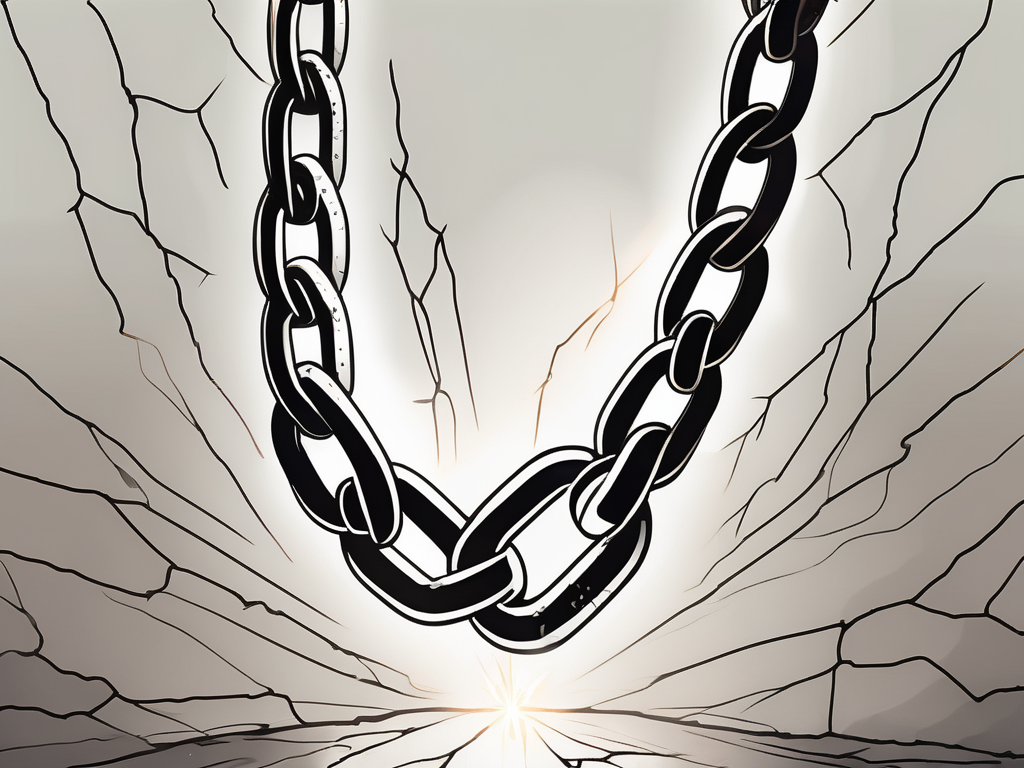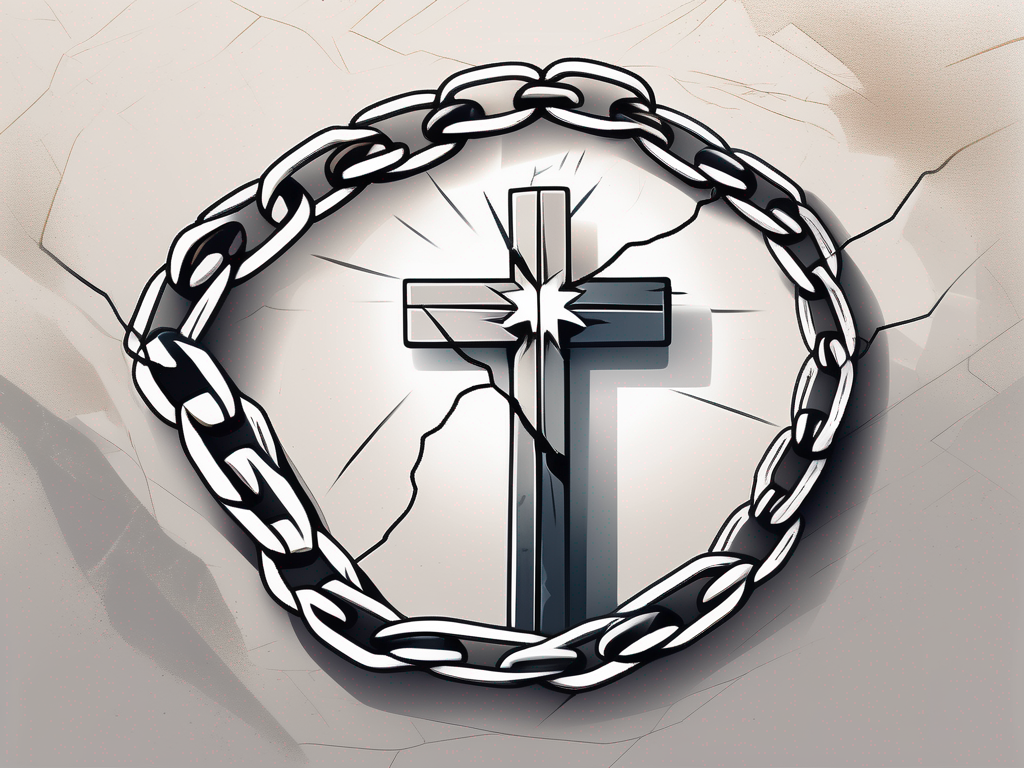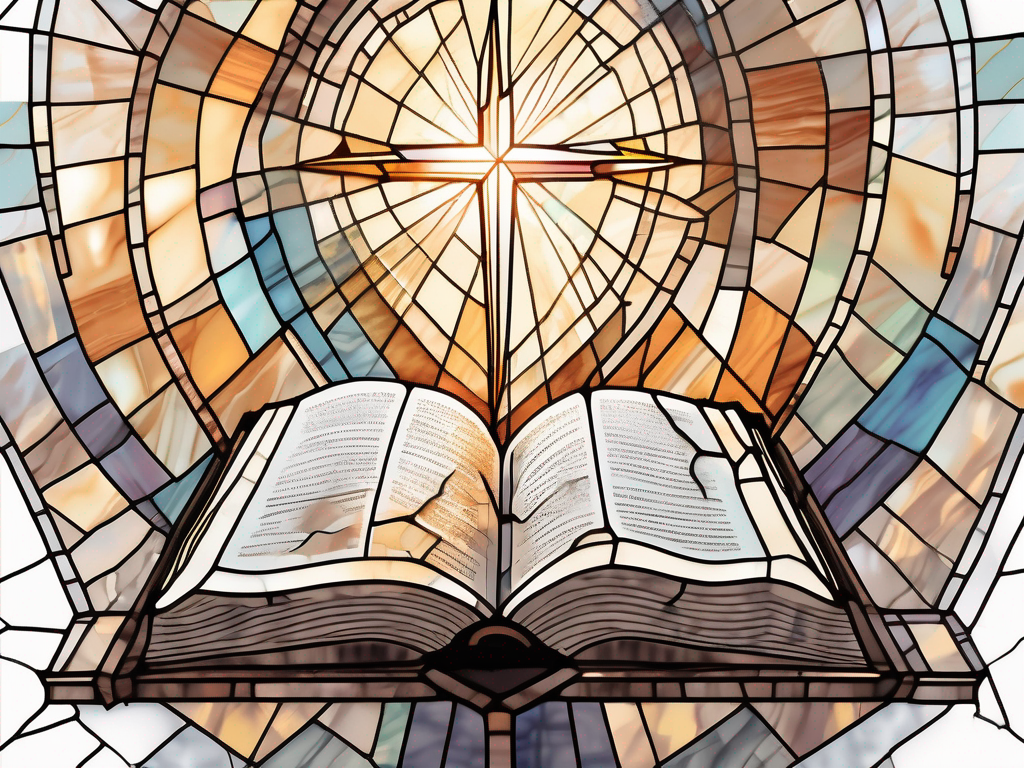Pain is a universal part of the human experience. We’ve all felt it at some point in our lives – physical pain, emotional pain, spiritual pain. It’s something we can’t escape. But what does the Bible say about pain? How does it define it, explain it, and provide guidance for navigating through it? Let’s take a closer look.
Understanding the Concept of Pain in the Bible
In order to grasp what the Bible says about pain, we first need to understand how it defines the concept. Pain, in biblical terms, is not merely physical or emotional discomfort. It encompasses a much broader spectrum. The Bible portrays pain as a consequence of the brokenness of the world caused by sin. It is a reminder that we live in a fallen world, marred by sin and its consequences.
The biblical view of pain acknowledges its complex nature – it can be physical, emotional, mental, and spiritual. It affects every aspect of who we are as human beings. However, pain is not without purpose.
When we delve deeper into the biblical definitions of pain, we discover a multifaceted understanding. One definition is that pain is a signal, a warning sign that something is wrong. Just as physical pain alerts us to a problem in our body, emotional and spiritual pain can serve as indicators of deeper issues within our hearts and souls. It is a call to introspection and self-reflection, urging us to examine our lives and seek healing and restoration.
Another biblical definition of pain is that it is a refining fire. Just as gold is purified in the furnace, pain can act as a tool to refine our character, strengthen our faith, and produce endurance and perseverance. It is through the trials and tribulations of pain that our true selves are revealed, and we have the opportunity to grow and mature in our relationship with God.
The purpose of pain, according to Scripture, extends beyond individual growth. It serves a greater purpose in our lives and in the world around us. Pain has the ability to teach us valuable lessons and draw us closer to God. It reveals our need for Him and reminds us of our dependence on Him. In our moments of pain, we are reminded of our limitations and are humbled before the Almighty.
In addition, pain can be a catalyst for growth and transformation. It can deepen our empathy and compassion for others who are also experiencing pain. When we have walked through the valley of pain, we are better equipped to come alongside those who are hurting, offering them comfort, understanding, and support. Pain has the power to unite us in our shared humanity and foster a sense of community and solidarity.
Moreover, pain can be an opportunity for us to lean on God’s strength and experience His comfort and peace. In our moments of deepest pain, when we feel overwhelmed and broken, we can turn to God for solace and find refuge in His loving arms. It is in these moments of vulnerability that we experience the depth of His love and the power of His presence.
Pain in the Old Testament
The Old Testament offers several insights into the experience of pain. One notable example is the story of Job.
Job’s Suffering: A Deep Dive
The book of Job presents the story of a man who endured unimaginable pain and suffering. Job lost his wealth, his children, and his health. He was left in a state of despair, wrestling with questions of why he was experiencing such intense pain.
As we delve deeper into the story of Job, we see a man who was not only physically afflicted but also emotionally tormented. His friends, instead of offering comfort, questioned his integrity and suggested that his suffering was a result of his own wrongdoing. Job’s pain was not only physical but also psychological, as he grappled with feelings of guilt and shame.
Job’s suffering raises profound questions about the nature of pain and the human experience. It challenges our understanding of justice and fairness, as Job was a righteous man who did not deserve such anguish. This story reminds us that pain can be a part of our journey, even if we have done nothing to deserve it. Pain does not always correlate with our actions or character. Instead, it underscores the brokenness of the world we live in and the mystery of God’s ways.
Pain and Punishment in the Old Testament
In the Old Testament, pain is also depicted as a consequence of disobedience to God’s commands. The Israelites faced pain and suffering when they turned away from Him and pursued their own desires. The book of Exodus recounts the plagues that befell Egypt as a result of Pharaoh’s refusal to let the Israelites go. These plagues, which included painful boils, darkness, and the death of the firstborn, were a direct consequence of Pharaoh’s disobedience.
However, even in the midst of punishment, God’s intention was not solely to inflict pain but to bring about repentance and restoration. The pain the Israelites experienced served as a wake-up call, a reminder of their need to return to God and follow His ways. It was an opportunity for them to recognize their wrongdoing and seek forgiveness.
Moreover, the Old Testament also offers stories of individuals who experienced pain as a result of their own choices. King David, for example, faced immense pain and suffering after his affair with Bathsheba and the subsequent murder of her husband, Uriah. David’s pain was not a punishment inflicted by God but a consequence of his own actions. It serves as a cautionary tale, warning us of the potential consequences of our choices and the pain they can bring upon ourselves and others.
In conclusion, the Old Testament provides a multifaceted perspective on pain. It shows us that pain can be a mystery, unrelated to our actions or character, as seen in the story of Job. It also highlights how pain can be a consequence of disobedience, serving as a means for repentance and restoration. Ultimately, these narratives invite us to reflect on the complexities of pain and the role it plays in our lives.
Pain in the New Testament
The New Testament offers a fresh perspective on pain, particularly through the life and teachings of Jesus.
Jesus, the Son of God, experienced pain during His time on earth. He endured rejection, physical torment, and ultimately gave His life on the cross. Jesus’ suffering demonstrates His deep understanding of human pain and His willingness to enter into it on our behalf.
Through His death and resurrection, Jesus offers hope and healing to all who are hurting. He can empathize with our pain because He Himself has experienced it firsthand.
But what does pain mean in the context of the New Testament? How does it fit into the larger narrative of God’s plan for humanity?
The Apostle Paul, a prominent figure in the early Christian church, also provides insights into the purpose of pain. He wrote extensively about his own experiences of suffering and how it brought him closer to God.
Paul encourages believers to find strength in their weaknesses, as it is in our weakness that God’s power is made perfect. He recognizes that pain can be an opportunity for spiritual growth and displays of God’s power.
But what about the pain that is not directly caused by persecution or physical suffering? What about the pain of loss, heartbreak, and disappointment?
In the New Testament, pain is not dismissed or ignored. It is acknowledged and understood as a part of the human experience. It is through pain that we can come to a deeper understanding of ourselves and our need for God’s grace.
Jesus’ teachings on pain and suffering are not meant to provide easy answers or quick fixes. Instead, they offer a framework for navigating the complexities of life and finding hope in the midst of pain.
So, as we reflect on the New Testament’s perspective on pain, let us remember that it is not a sign of God’s absence or punishment. Rather, it is an invitation to draw near to Him and find comfort in His presence.
Theological Interpretations of Pain
Throughout history, theologians have grappled with the meaning of pain and its implications for faith. Pain is a complex and multifaceted experience that raises profound questions about the nature of God and the human condition.
One theological interpretation of pain is that it serves as a test of faith. Some theologians view pain as a way to measure and strengthen our devotion to God. Just as gold is refined in fire, pain can reveal the authenticity of our beliefs and deepen our commitment to Him. It is in the crucible of suffering that our faith is tested and refined, enabling us to grow spiritually and draw closer to God.
However, it is essential to remember that pain is not a punishment for lack of faith. God’s love and grace are not contingent on our ability to endure suffering, but are freely given to us through Jesus Christ. Pain, in this perspective, is not a reflection of our worthiness or righteousness, but rather an opportunity for us to experience God’s love and grace in the midst of our struggles.
Another theological interpretation of pain is that it has redemptive power. Just as Jesus’ suffering led to the salvation of humanity, our own experiences of pain can lead to personal growth, empathy, and a deeper understanding of God’s love and mercy. Pain can strip away our illusions of self-sufficiency and reveal our need for God’s healing and redemption. It can break down the barriers of pride and self-centeredness, opening our hearts to the suffering of others and enabling us to extend compassion and support.
This perspective reminds us that even in the midst of pain, God can bring about beauty and transformation if we trust Him and allow His grace to work in our lives. Pain can be a catalyst for change, propelling us towards a deeper relationship with God and a greater sense of purpose. It can teach us valuable lessons about humility, perseverance, and the fragility of human existence.
Furthermore, pain can also serve as a reminder of the brokenness of the world and the need for justice and compassion. It can awaken within us a desire to alleviate the suffering of others and work towards a more just and compassionate society. Pain, in this sense, becomes a call to action, prompting us to seek justice, advocate for the marginalized, and stand against systems of oppression.
In conclusion, the theological interpretations of pain are varied and nuanced. Pain can test our faith, refine our character, and deepen our relationship with God. It can also lead to personal growth, empathy, and a greater understanding of God’s love and mercy. Ultimately, pain can be a transformative experience that shapes our spiritual journey and compels us to live out our faith in the world.
Coping with Pain: Biblical Guidance
When facing pain, we can find solace and guidance in the pages of Scripture. The Bible offers words of comfort, encouragement, and hope.
Scriptures for Comfort During Pain
- Psalm 34:18 – “The LORD is close to the brokenhearted and saves those who are crushed in spirit.”
- Matthew 11:28 – “Come to me, all you who are weary and burdened, and I will give you rest.”
- 2 Corinthians 1:3-4 – “Praise be to the God and Father of our Lord Jesus Christ, the Father of compassion and the God of all comfort, who comforts us in all our troubles.”
These verses remind us that we are not alone in our pain. God is with us, offering comfort, strength, and peace.
Prayers for Alleviating Suffering
- “Lord, I come to You in the midst of my pain. Please bring healing to my body, mind, and soul. I trust in Your power and wisdom. Help me endure, knowing that You are always with me.”
- “Father, I lift up to You all who are experiencing pain and suffering. May Your presence and grace be their comfort. Bring restoration, peace, and hope into their lives. In Jesus’ name, Amen.”
- “God, grant me the strength to endure pain with grace and trust. Use this experience to mold me into the person You want me to be. Help me to glorify You even in the midst of my suffering.”
These prayers direct our hearts and minds toward God, seeking His intervention, and surrendering our pain to His care.
So, what does the Bible say about pain? It recognizes pain’s presence and impact in our lives, but it also assures us that pain has purpose and is not without hope. With God’s guidance and support, we can navigate the complexities of pain and find comfort in His unending love.












